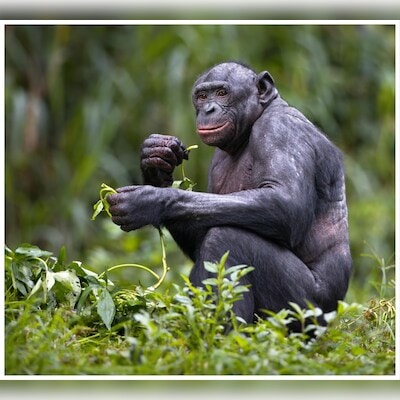Research has shown that chimpanzees seek out and eat medicinal herbs to treat injuries. Image: Shutterstock
2 min read Last Updated: June 22, 2024 | 09:13 AM IST
Research has shown that chimpanzees seek out and eat medicinal herbs to treat injuries.
Wild chimpanzees are known to eat a variety of plants, but the researchers say it’s difficult to tell whether the chimps are intentionally seeking out medicinal plants to cure ailments, or whether they just “passively” eat them by chance.
The study is published in the journal PLoS ONE.
In Uganda’s Budongo Central Forest Reserve, researchers including from the University of Oxford in the UK observed the behaviour and health of 51 wild chimpanzees from two habituated communities.
The researchers observed a male chimpanzee with an injured hand seek out and eat fern leaves, which may have helped relieve pain and swelling, and recorded another chimpanzee with a parasitic infection eating the bark of the cat tree (Scutia myrtina).
The team also tested plant extracts from trees and herbs in the sanctuary for anti-inflammatory and antibiotic effects, which the chimpanzees may have consumed to self-medicate.
These species included plants that are not part of the chimpanzee’s normal diet, but are eaten for their healing properties.
The authors found that 88% of the plant extracts had antibacterial properties that inhibited bacterial growth, and 33% had anti-inflammatory properties.
The dead wood of the plant Alstonia boonei showed the strongest antibacterial and anti-inflammatory properties, which could make it useful for treating wounds, the researchers said.
The bark and resin of the East African mahogany tree (Khaya anthotheca) and the leaves of the fern (Christella parasitica) have been found to have powerful anti-inflammatory properties.
The findings suggest that chimpanzees were seeking out and eating specific plants with medicinal properties, and the authors say this is one of the first studies to document evidence of this kind.
Medicinal plants growing in Budongo Central Forest Reserve could also be useful in developing new medicines to address the challenges of antibiotic-resistant bacteria and chronic inflammatory diseases, the authors say.
The findings demonstrate that observing and learning from our primate peers could speed new drug discovery, and underscore the importance of protecting forest pharmacies, the researchers said.
(Only the headline and photo of this report may have been modified by Business Standard staff. The rest of the content is auto-generated from a syndicated feed.)
First Published: 22 Jun 2024 | 09:13 AM IST

